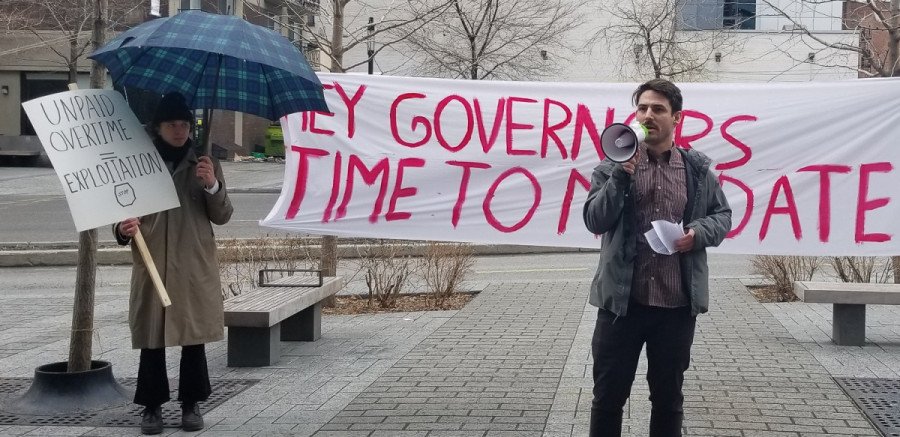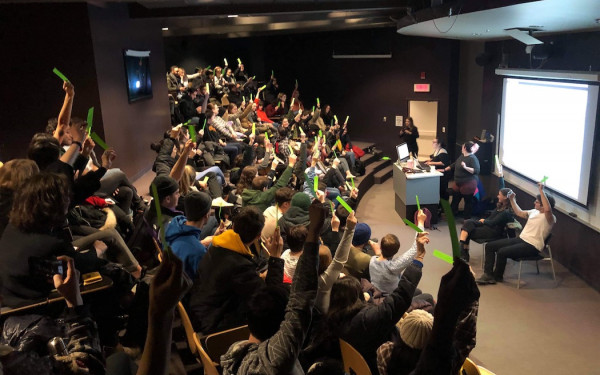TRAC Disappointed with New Collective Agreement Negotiations
Union Gathers Protests During Board of Governors Meeting
Teaching and Research Assistants at Concordia continue to tussle with the university over wages and split contracts.
On Wednesday April 18, members of TRAC gathered outside of Concordia University’s GM building, while inside a Board of Governors meeting was underway.
TRAC’s last collective agreement expired May 1, 2016. Both TRAC and the university have been negotiating a new agreement since the fall.
The union came to protest because Concordia’s bargaining team has refused TRAC’s demand the university stop splitting contracts and give wage increases for teaching and research assistants.
Split contracts are based according to the task performed, meaning that TA’s must sign two contracts—one for teaching hours and one for hours spent marking students’ work. TA’s are paid $24.93, while markers are paid $20.21.
“What do we get for our contributions?” said Jeremy Tessier through the megaphone. “We get precarious work. We get unpaid overtime. We get unpaid training—which is illegal by the way. We get reduced hours, we get split contracts.”
Tessier—who will takeover as TRAC president on June 1—is a TA in the Geography, Planning and Environment department. Tessier worked as a TA from 2015 to 2017, but when he returned for his third year he said his hours dropped from 130 last winter semester to 65 hours.
While discussing matters such as the grievance process and job-appointment TRAC’s current president Alexandre St-Onge-Perron said the union gained “significant victories”.
When it came to discussing matters relating to financial sections of the collective agreement, St-Onge-Perron also said Concordia was not willing to negotiate a new three-year agreement.
“[It was] assumed by everyone to be a three year collective agreement like the previous one, [and that it would] cover the years 2016-2017, 2017-2018, and 2018-2019,” said St-Onge-Perron in an email.
St-Onge-Perron added that TRAC only received an offer for 2016-2017 and 2017-2018, with the collective agreement expiring on May 1, 2018, with no solutions over split contracts.
“If we had to bend to the employers demands, it would mean no solution to the issue of split contracts and no solution to the facts that RAs are underpaid,” St-Onge-Perron said.
TRAC also doesn’t want to settle for a collective agreement that doesn’t provide a living wage of $15 per hour for undergraduate RAs.
“I’m not blaming the negotiator here, I’m blaming the top administrator of the university who didn’t give the negotiator mandate to negotiate a good collective agreement with us,” he continued.
It’s not the first time TRAC chose to publicly voice their concerns. Back in October, TRAC’s bargaining officer Gonzalo Renato Quintana Zunino protested outside of the GM building, dressed up as Jon Snow from the HBO series Game of Thrones, just as they were set to re-enter negotiations with Concordia.
This past February, TRAC continued to make their concerns public when they sent Concordia President Alan Shepard a giant Valentines day card. The card wrote, “Many of us do unpaid hours, do not get paid a decent wage, have different contracts for essentially the same job, and are misled during the hiring process.”
The Concordia Student Union newly elected General Coordinator, Sophie Hough, also stood in solidarity with TRAC.
“As a student representative, I think it’s important to stand up when the university is taking advantage of students like it is in this case, and to take a stance against that,” she said.
St-Onge-Perron said TRAC will continue to mobilize to convince the university to address the issue if not settled.
“Shepard and the people on [the Board of Governors] are not letting the negotiator put a number on the table, they are preventing the negotiator from doing their job and that is very problematic,” he said.




_600_375_90_s_c1.jpg)
_600_375_90_s_c1.jpg)
_900_642_90_600_375_90_s_c1.jpg)